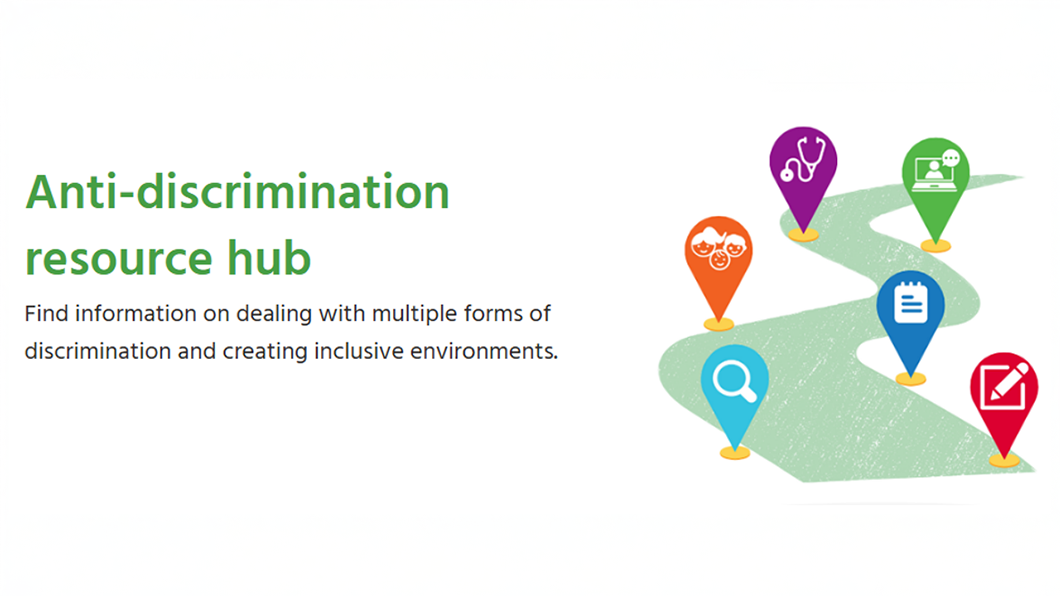
An evidence-based digital hub supporting youth with disabilities, families and service providers
As Ontario observes Anti-Bullying Week (Nov. 17-21, 2025), the TRAIL Lab at Holland Bloorview’s Bloorview Research Institute (BRI) is highlighting the importance of kindness, allyship and inclusion, values that also underpin its new Anti-Discrimination Resource Hub. The online space aims to help youth with disabilities, families and service providers access credible, practical tools to understand and address discrimination and ableism.
The hub will be officially introduced at the 20th Annual Bloorview Research Institute Symposium on Nov. 25 and 26, where attendees can visit the TRAIL Lab’s interactive booth to explore the site, pick up resources and learn about its development.
“We aim to empower young people and the professionals who support them by providing the knowledge and confidence they need to challenge discrimination and build inclusive spaces through this hub.” says Dr. Sally Lindsay, senior scientist and lead of the TRAIL Lab.
Rooted in research and lived experience
The hub grew out of a multi-year research project led by Dr. Sally Lindsay, Discrimination, ableism and racism hurt but inclusion can heal: Listening to the intersectional lived experience of youth with disabilities and co-creating solutions.
Researchers interviewed 52 youth with disabilities, along with clinicians and service providers. They uncovered that many young people face multiple forms of discrimination related to disability, race, gender and other identities. These experiences often restrict access to education, employment and health care, and can negatively impact well-being and belonging.
“Youth told us they wanted accessible, trustworthy information and real-life examples of how to respond to discrimination,” says Janice Phonepraseuth, a research coordinator in the TRAIL Lab. “Clinicians and service providers also requested practical tools to address bias and foster inclusion.”
Youth leader Hannah Boamah, who contributed a lived-experience video to the hub, shares her perspective on the importance of anti-discrimination education and embracing different perspectives.
“Understanding the intricate stories of youth like me should not be where your learning ends and your allyship begins — it should be the foundation for meaningful change and inclusive action.”
Discrimination, like bullying, can leave lasting emotional and social harm. The hub promotes empathy and allyship, core values of Anti-Bullying Week, by equipping young people with language, strategies and stories that demonstrate how inclusion begins with understanding.
A one-stop hub for inclusion
The Anti-Discrimination Resource Hub brings together more than 100 curated resources, including guides, toolkits, videos, publications and lived-experience stories.
Visitors can explore six main sections:
- Understanding discrimination and inclusion – introductory resources on ableism, racism and intersectionality.
- Resources for youth and families – advocacy tools, health-literacy tips and guidance on topics such as racism, sexuality and disability disclosure.
- Resources for service providers – training materials and best practices on inclusive language, workplace accommodations and anti-bias approaches.
- Lived-experience videos – youth and family leaders share personal insights on empathy, education and allyship.
- TRAIL Lab publications – peer-reviewed research on discrimination and inclusion.
- Other resources – evidence-based toolkits from organizations such as UNICEF, the Ontario Human Rights Commission and McMaster University.
By gathering these materials in one accessible place, the hub helps users learn, reflect and take action — whether by advocating at school, creating inclusive care environments or standing up for a peer.
Family leader Giseli Bignardi, who also contributed a video to the hub, shares her experiences as a parent and her recommendations for how systems can better address discrimination and ableism toward youth with disabilities.
“Educate yourself. Don’t be afraid to look deeply at your values, even when it feels uncomfortable. We all need to revisit what we’ve been taught about how people should be and how we understand each other. I often say people are like icebergs — we only see their actions, but real understanding comes from going deeper. Everyone has a place to speak up — whether through lived experience or by making space for others who need more support to be heard. As we age, our needs may shift in ways we can’t always predict. Inclusion ensures that all of us are treated with dignity when we need support — and when that time comes, how would you want to be treated?”
Creating inclusive communities
Aligned with Holland Bloorview’s 2030 Strategic Plan and BRI’s strategic priorities on inclusion, diversity, equity, accessibility and anti-racism (IDEAA), the hub underscores the hospital’s broader mission to advance socially accountable care and research.
Funding for the project was provided by the Social Sciences and Humanities Research Council (SSHRC), with matching support from the Kimel Family Opportunities Fund through the Holland Bloorview Foundation. The hub’s development also involved youth and family leaders, the Evidence to Care team and the Communications and Public Engagement team.
Anti-Bullying Week calls on all Canadians to speak up for kindness and respect. The Anti-Discrimination Resource Hub reflects that same spirit, turning research into action and giving youth the tools to create safe, inclusive spaces wherever they learn, play or work.
Together, we can build communities where every young person feels valued and included.
Explore the hub: Anti-Discrimination Resource Hub
By Priyanka Shah